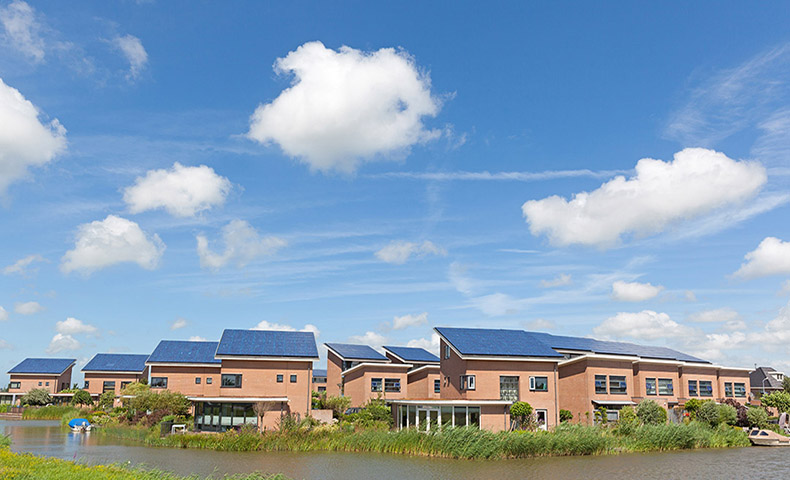
Can’t afford solar power on your own? Join a solar co-op.
That’s the offer being made to residents in Allegheny County, Pennsylvania after some neighbors there decided to form a solar co-op.
Such efforts are meant to save money and make going solar easier.
“Co-op participants will select a single company to complete all of the installations. They will then have the option to purchase panels individually based on the installer’s group rate.
By going solar as a group and choosing a single installer, participants can save off the cost of going solar,” they say.
A co-op (cooperative) is a group of people acting in unison to meet the needs of all its members.
Thus, a solar co-op is a group of neighbors joining together to set up solar panels on their roofs, but they purchase their solar systems in bulk. By doing so, they receive a discounted price (ranging from 15 to 33%) from the solar installer. Each participant signs their individual contract with the installer, but everyone gets the same discount. Co-ops generally need at least 20 participants in order to get a bulk discount. And solar co-ops are not limited only to residential customers. Businesses can also sign up and participate.
“Co-ops take advantage of the group’s bulk-purchasing power to get discounted pricing and a quality installation. Co-op volunteers choose an installer on behalf of the entire group through an open and competitive bidding process. The selected installer provides everyone in the group with a personalized proposal for their consideration,” explains Solar United Neighbors (SUN), an organization that helps create these groups.
With a co-op, solar system installers save on marketing costs and through volume purchasing and pass on savings to co-op members.
Solar United Neighbors is free to join and can help residents save in the process of going solar. The group reports a return on investment in as little as 7-10 years and as much as 15 percent in profits.
Apart from the savings, solar co-ops offer the ability to go through the process with so many others. You will have the benefit of informational sessions and being on an email listserv throughout the process.
Generally, a coordinating body helps to educate potential co-op members about the basic details of solar power, discussing the solar power pros and cons without sales pressure.
Once a sufficient number of individuals have signed up and qualified, SUN distributes a statewide request for bid proposals from installers. A bid committee of co-op members is selected and, with the assistance of a SUN expert, the committee reviews the bids and chooses an installer. The chosen installer then will offer a proposed solar system, based on the bid price, to each individual co-op member. The co-op member can then decide whether or not to accept the offer and enter into an installation contract.
There are examples of them all over the country.
For instance, the Mt. Pleasant Solar Cooperative is a group of over 300 households in the Mt. Pleasant community of Washington, D.C. The founders of the co-op wanted to put solar on their roof and decided if they were going to go through all the work to figure out how to install photovoltaics, they would have more impact by including more people in the project. They also wanted to reduce the costs of the solar systems, and figured that a bulk purchase, along with sharing expenses and expertise, significantly would bring down the price.
The drawbacks
Just as there are pros, there are also cons to joining a solar co-op.
For one, the contractor chosen from the project may be from outside the area or community and may not be as invested in providing the best quality of service.
Similarly, given the discounts, the installer may skimp on quality, selecting parts and materials of inferior tier for the project, which in the long run can impact energy efficiency, warranties and support and maintenance. In addition, if the installer is a small vendor, he will surely hire extra help to finish the project and these laborers may not be as capable or knowledgeable in solar installations as their counterparts.
Also, each member of the solar co-op may have to wait longer to get their solar power system installed as he/she waits his/her turn. Remember, the contractor is installing dozens of similar solar arrays around the neighborhood and you might be at the end of the list.
While you wait your turn, check the solar contract carefully to better understand warranties and other aspects of your solar system installation. If you have concerns, ask questions.
While you may not be making all the decisions in a solar co-op, ultimately the solar panels will go on your roof and you stand to benefit from them, as well as carry the burdens if something goes wrong in the future.
HahaSmart Blog - More Solar Tips and Guide
HahaSmart News - Stay Informed
Your Solar Incentives - See Credits and Incentives in Your Area
Check Your Home's Solar Price - See How Much You Save
Register Now - Unlock The Lowest Solar Prices in Your Area


Input your address to see if it is solar friendly and how much you can save with solar.
Great. Your address is perfect for solar. Solar incentive is still available. Select monthly utility cost and calculate the size of solar system you will need now.
| kw System size | years Payback period | Lifetime savings |
No money down, 100% finance is available.
|
|
Design the perfect solar system for your home in only a few minutes! |
Comments